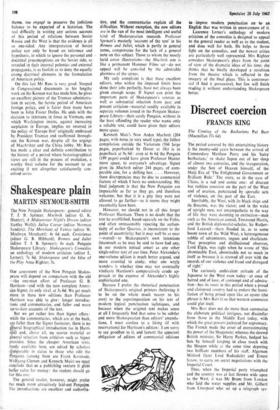Shakespeare plain
MARTIN SEYMOUR-SMITH
The New Penguin Shakespeare: general editor T. J. B. Spencer. Macbeth (editor G. K. Hunter); A Midsummer Night's Dream (editor Stanley Wells); Julius Caesar (editor Norman Sanders); The Merchant of Venice (editor W. Moelwyn Merchant); 4s 6d each. Coriolanus (editor G. R. Hibbard); Romeo and Juliet (editor T. J. B. Spencer); 6s each. Penguin Shakespeare Library: Shakespeare's Comedies an anthology of modern criticism (editor L. Lerner); 7s 6d. Shakespeare and the Idea of the Play Anne Righter; Ss.
Our assessment of the New Penguin Shakes- peare will_depend on comparison with the old —the one-man effort of Professor G. B. Harrison—and with the now complete Ameri- can Signet, its only rival, at 3s 6d. We get much more in these new editions than Professor Harrison was able to give: longer introduc- tions and commentaries, and fuller and more up-to-date accounts of the text.
But we get rather less than Signet offers: while the commentaries, which are at the back, are fuller than the Signet footnotes, there is no general biographical introduction (as in Harri- s2n) and, above all, no source material or general selection from criticism such as Signet provides. Since the cheaper American texts, freely available here, are edited by scholars comparable in status to those who edit the Penguins (among them are Frank Kermode, Wolfgang Clemen and Kenneth Muir) we must conclude that as a publishing venture it giVis better value for money: the student should go for this one.
The general reader, however, might prefer the much more attractively laid-out Penguins. The introductions are excellent and authorita-
five, and the commentaries explain all the difficulties. Without exception, the new editors are in the van of the most intelligent and useful kind of Shakespearian research. Professor Spencer's masterly 'account of the text' in his Romeo and Juliet, which is partly in general terms, compensates for the lack of a general
e note on this subject. Those to whom the mostly lurid cover illustrations—the Macbeth one is like a permanent Hammer Films set—do not appeal will be consoled by the admirable plainness of the spines.
My only complaint is that these excellent editors, who within the imposed limits have done their jobs perfectly, have not always been given enough scope. If Signet can print the important parts of Shakespeare's sources as well as substantial selection from past and present criticism—material readily available in separate volumes issued in the Penguin Shakes- peare Library—then surely Penguin, without in the least offending the reader who wants only a reliable text, could have given their editors more space.
Kenneth Muir's New Arden Macbeth (204 pages, with notes in very small type), the fullest compilation outside the Variorum (566 large pages, paperbacked by Dover at 18s) is in paperback at 9s 6d: even at 4s 6d the Penguin (199 pages) could have given Professor Hunter more space, to everyone's advantage. Signet gives its Macbeth editor 244 pages, of com- parable size, for a shilling less. . . However, these discrepancies may be due to commercial factors of which I have no understanding. My final judgment is that the New Penguins are impeccable as far as they go, and therefore welcome; but that it is a pity they were not allowed to go further—as it seems they might reasonably have been.
However, we should not in all this forget Professor Harrison. There is no doubt that the text he established, based squarely on the Folio, and often unreasonably rejecting the authen- ticity of earlier Quartos, is inconsistent to the point of eccentricity; but it may well be as near —overall—to Shakespeare's own intentions (inasmuch as he may be said to have had any, in our modern textual sense) as any other single-editor text of our time. Peter Alexander's one-volume edition is much better argued, and more essential to study; what one wryly wonders is whether time may not eventually vindicate Harrison's comparatively crude ap- proach at the expense of Alexander's highly sophisticated one.
Because I prefer the rhetorical punctuation of Shakespeare's original printers (believing it to be on the whole much nearer to his own) to the superimposition on his text of modern logical punctuation techniques, and because when the original text makes sense at all I frequently find that sense to be subtler and more Shakespearian than editors' emenda- dons, I must confess to a liking (if with reservations) for Harrison's edition : I am sorry to say goodbye to it, and lament the apparent obligation of editors of commercial editions
to impose modern punctuation on to• an English that was written in unawareness of it.
Laurence Lerner's anthology of modern criticism of the comedies is designed to appeal to the general reader as well as to the student, and does well for both. He helps to throw light on the comedies, and the newest critics are particularly well represented. Mrs Righter considers Shakespeare's plays from the point of view of the dramatic ideas of his time; she thinks that he finally developed a revulsion from the theatre which is reflected in the imagery of the final plays. This is controver- sial (I find it persuasive), but few will finish reading it without understanding Shakespeare better.






























 Previous page
Previous page